#now for the reach tags
Text

#i actually didnt have to edit this at all besides the color#my fuckass iphone camera did the work for me#upl#houses#upstate ny#photography#now for the reach tags#liminal spaces#unreality#weirdcore
9 notes
·
View notes
Text


it doesn't matter how babygirl ur fav man is, he will ALWAYS be ten times sexier as a woman
#PLEASE be respectful in the tags for the love of god#drawing the fav is sm fun when they're genderbent like wow now i can be attracted to ANOTHER version of you😍#im so glad all of nakahara chuuya's fans are lesbians this guarantees my post will reach its target audience#i felt very straight drawing this btw. my nose was NOT bleeding. i did NOT constantly hear a ringing noise.#bsd would infinitely be better if the entire cast was made up of women#bungou stray dogs#bungo stray dogs#bsd#nakahara chuuya#chuuya nakahara#fem chuuya#also no hat im sry i cant draw hats💔#maybe in another post#lotus draws
5K notes
·
View notes
Text
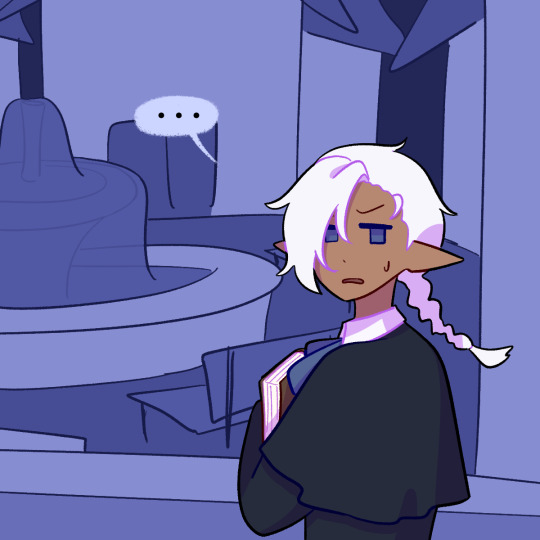
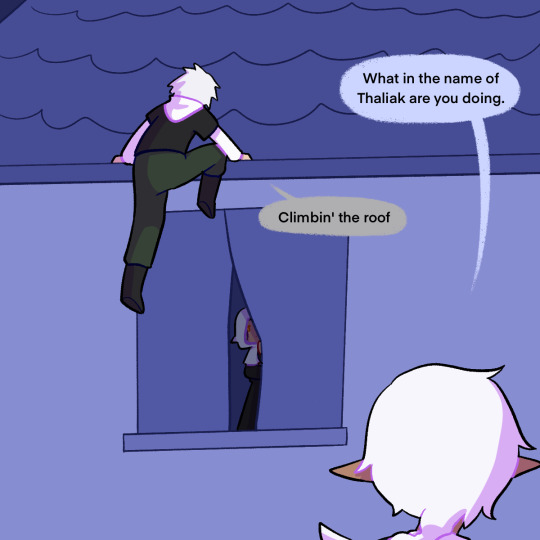
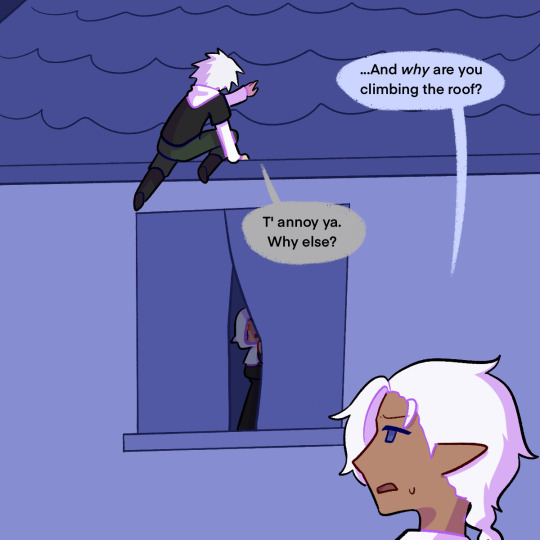
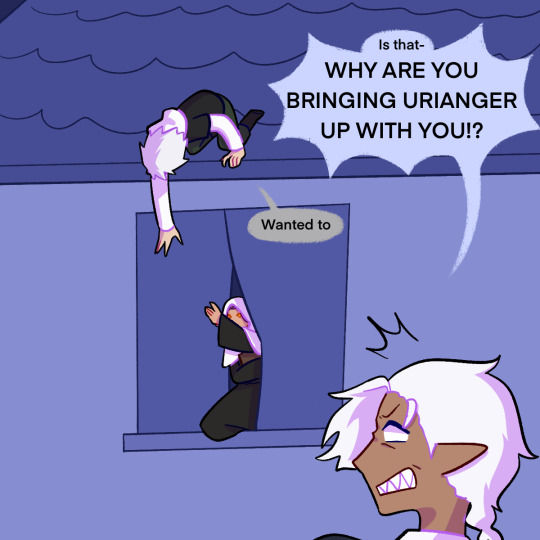
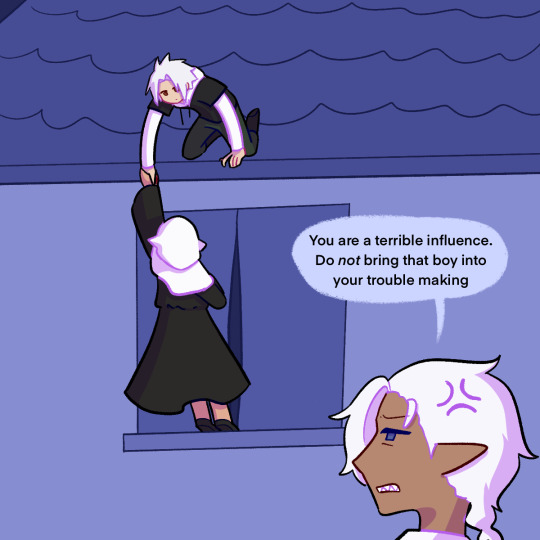
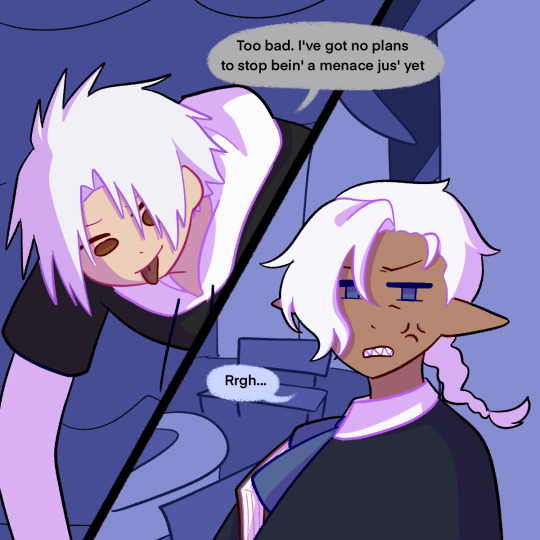
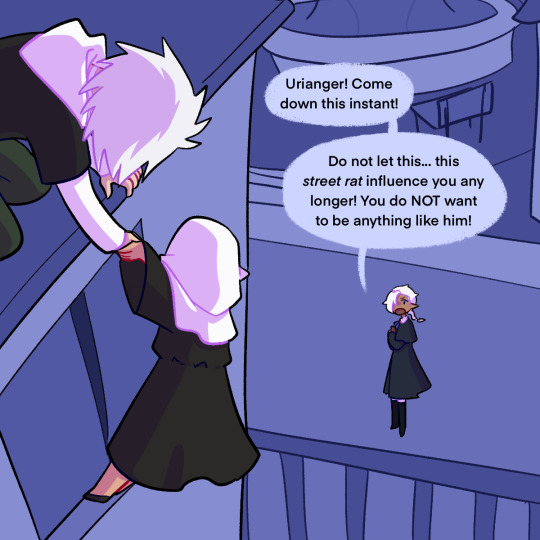
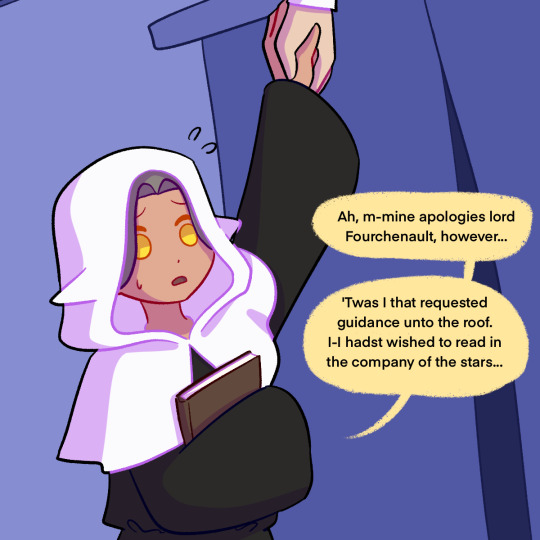
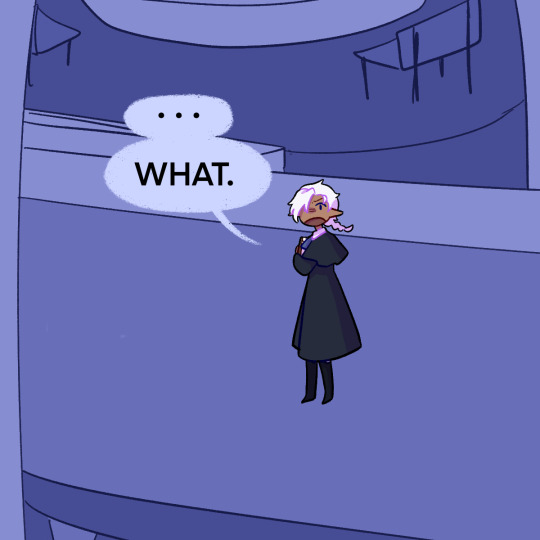
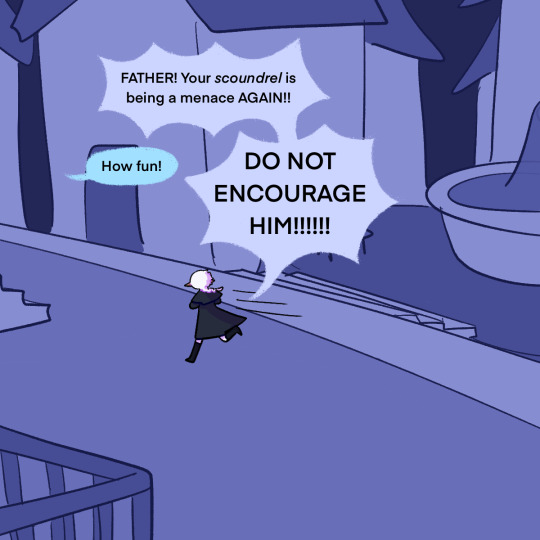
I made this AAAAGES ago and forgot to post it and now I'm annoyed by how it's rotting away on my phone so here. Bratty teen Thancred being a menace to Fourchenault (and a bad influence on Urianger lol)
#we never see fourchenault & thancred interact in any meaningful way (outside of Group Interaction) and i like to imaginr#its bc fourchenault Did Not Like thancred when they were kids and has resolved to just ignore him now#and thancred-the little bastard that he is-wouldve 100% messed with him on purpose if he had the chance#bc i just KNOW he pulled stunts like this to annoy fourchenault all the time#fourchenault tells him to eat more orderly and thancred gets more messy on purpose yk. he is wired to be petty against stuffy rich kids#also urianger isnt actually being influenced much he has always been down to break the rules if he wants to#hes taught by louisiox thats like a requirement. him & his group of unconventional little smartypants#only reason he went to thancred specifically for help here is bc 1) he knows thancred knows how to easily get onto the roof and#2) hes like idk 13 here so hes still a tiny baby size. hes too short to reach up lol#anyway thats enough silly kid rambling time to tag#fourchenault leveilleur#thancred waters#urianger augurelt#final fantasy#final fantasy 14#final fantasy xiv#ff14#ffxiv#art#my art#xanders art#digital art#fan art
2K notes
·
View notes
Text
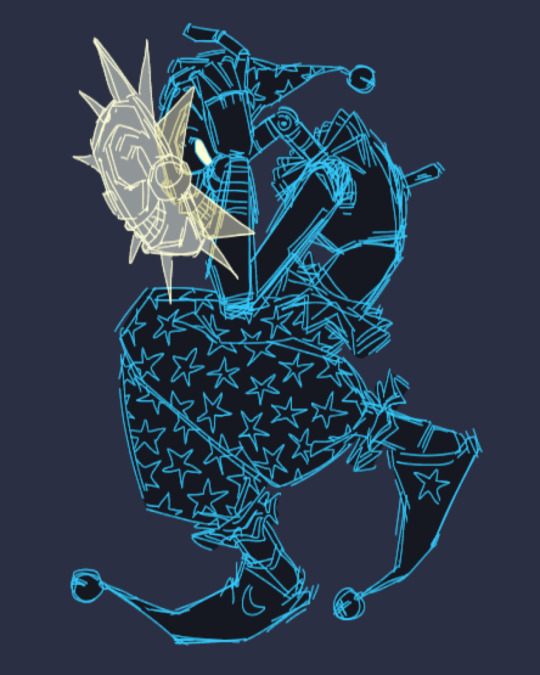
substitute
#my art#daycare attendant#dca fandom#moondrop#<- dca.. they're back in town ...#not tagging sun bc thats just their head :p#anywayyy hopefully this means something to someone. that's all i could ever wish for when it comes to my art#thats probably a bit too sentimental or something but sometimes it's hard to tell if the stuff you make is actually reaching people#or if you're just another person making content to satiate an insatiable crowd#is my art edible? is it a meal to you? is it a one time only thing? does it have any lasting effect on you?#is it just nutrients to sustain you? or is it something that will genuinely stick to you for at least longer than the first second?#i will stop talking now. you can eat my art as much as you'd like but can you at least savor it a little? compliment the chef a little bit?#for the ones who've read this far: this is actually for an AU i've been thinking about recently. i won't be sharing what it's about lol#but if you wanted some context for this... here you go. i'd like to think this has more meaning to it than just being an AU though#and maybe me not disclosing what the AU is will make you think about this post for a bit longer? it's a mystery now....#aaaand i just noticed i forgot the bells on the ribbon on their arm. great. excellent. perfect. whatever
735 notes
·
View notes
Text

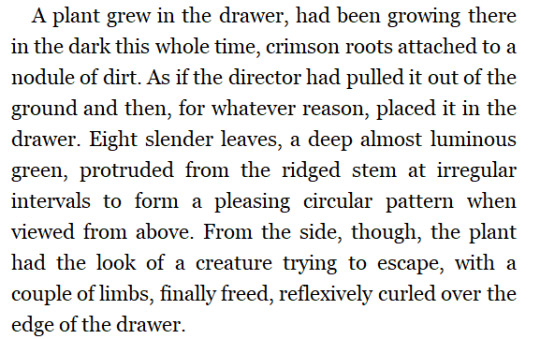
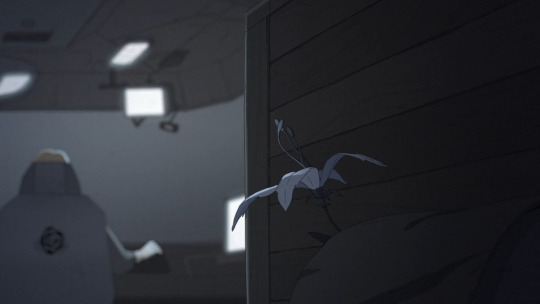

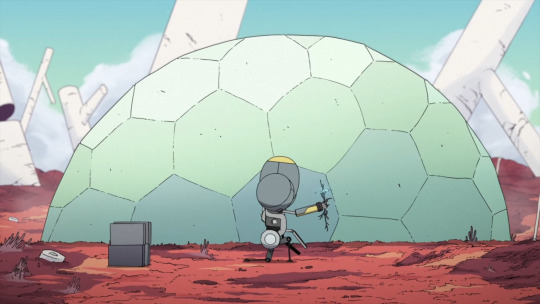
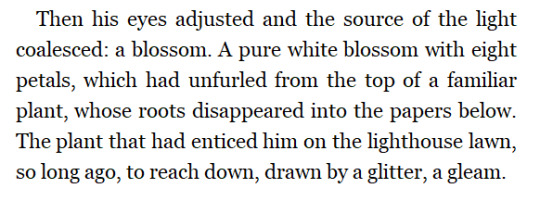

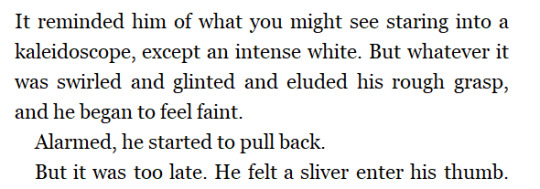



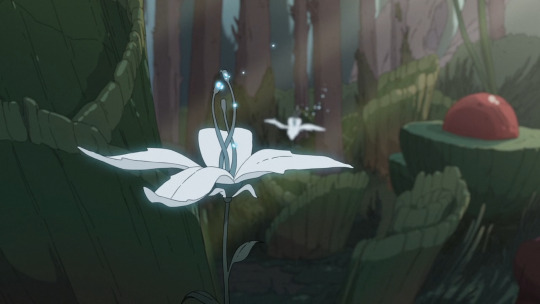
Scavengers Reign (Joseph Bennett, Charles Huettner, 2023) // The Southern Reach Trilogy, from Authority and Acceptance (Jeff VanderMeer, 2014)
#scavengers reign#southern reach#southern reach trilogy#scavengers reign spoilers#web weaving#comparatives#<- idk which tag im using now#authority#acceptance#jeff vandermeer#who's the audience for this. just me? well. :^)#desc in alt text#oh i suppose mr vandermeer might be the audience for this as he was tweeting about the show. but uhhhhhhh
2K notes
·
View notes
Text
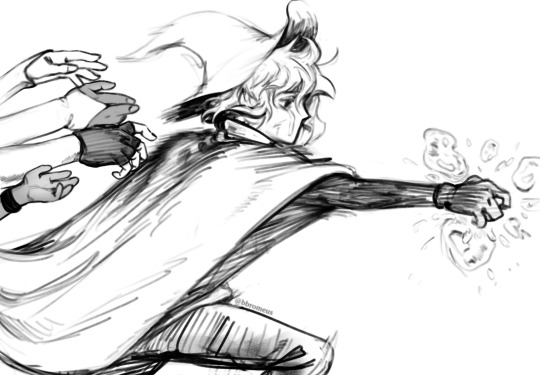
we’re not gonna make it…
- - -
I drew this a while ago thinking of siffrin reaching for the tears while their friends watch, unable to do anything... how they must freak out in those split seconds, and how they’re never fast enough. well!
I’m only on ACT 2, so please be gentle in the tags <3
#I AM ONLY ON ACT TWO PLS SPARE ME IN THE TAGS#TYSM ! <3#isat#in stars and time#isat siffrin#in stars and time siffrin#siffrin#i wanted isa's hand to be the closest to reaching him <3#and the one that seems most desperate#now i am thinking abt how isa would feel witnessing this every time#i cant live easily bc of isat... someone save me#my art
1K notes
·
View notes
Text



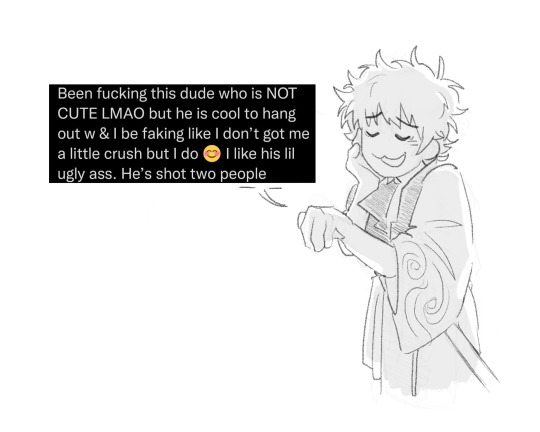
oh no! more ginhiji
#hhhhhhhhhhhh theyyy areeee eatinggggg myyyy BRAIIIIIN#using them as a coping mechanism to avoid the horrors of silver soul#i reached the second half and i. i need a breather#i’m trying to figure out what my favourite dynamic of ginhiji is so i can make comics about it later but rn my brain is just like#haha they want to punt each other into the sun yet they are inexplicably drawn to each other so they may as well burn together#gin san being like oh well i guess this is happening now?? and toshi trying to gaslight himself out of this waking nightmare#it’s very funny to consider#they are very much a romantic comedy but more emphasis on the comedy aspect with tragedy bits coming out of nowhere to kill you dead#so like gintama yk#also hijikata’s hair is a nightmare to draw im trying so hard#girl help#sakata gintoki#hijikata toushirou#ginhiji#hijigin#gintoki x hijikata#hijikata x gintoki#there are so many tags for one pairing hhhh#gintama#ok bye
2K notes
·
View notes
Text

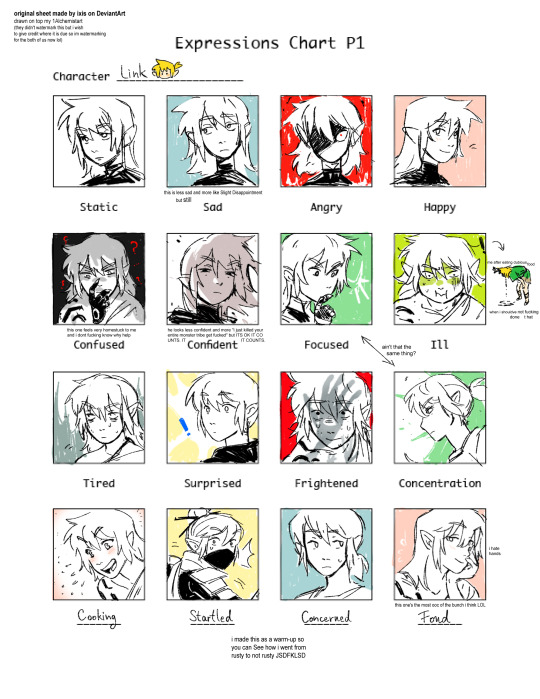




returns after 2 months with art from a completely different fandom
Greetings. hows it goin KLSDFKLSD
ive been going through it (a bit o' burnout with a dash of my health going ough augh oogh) but hewwo ill make a bit of an effort to post more again owo
#totk#totk spoilers#loz totk#tears of the kingdom#link totk#zelda totk#zelink#ganon#ganondorf#ganon totk#link zelda#botw#legend of zelda#my art#ok i have reached the rambling side of the tags OK SO#TUMBLR THE TAGGING WORKS DIFFERENTLY AGAIN NOW? SDFKLSDKL#how many updates are they gonna make to the post editor goddamn#also before you ask no i dont have botw totk nor a switch#for i dont have the money for all that#so i am admiring the game from afar and living vicariously through playthroughs#also wow for every tag i add the DRAFT SAVED thingy pops up JKDKL thank u tumblr
3K notes
·
View notes
Text
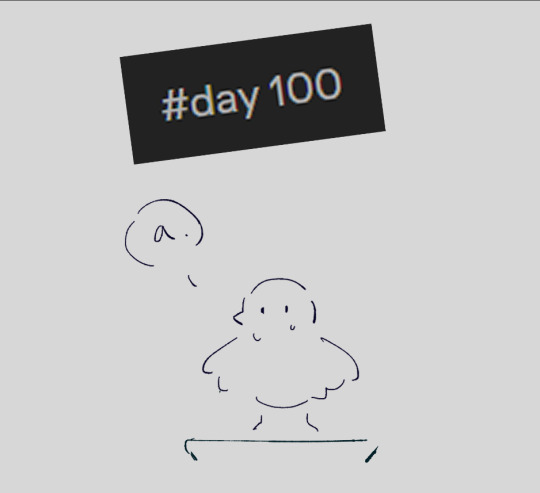
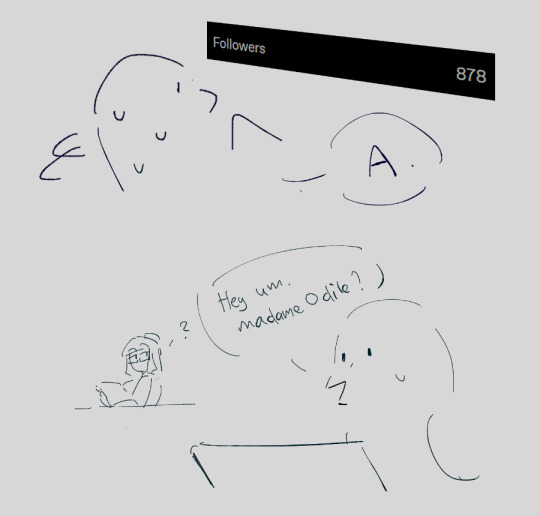

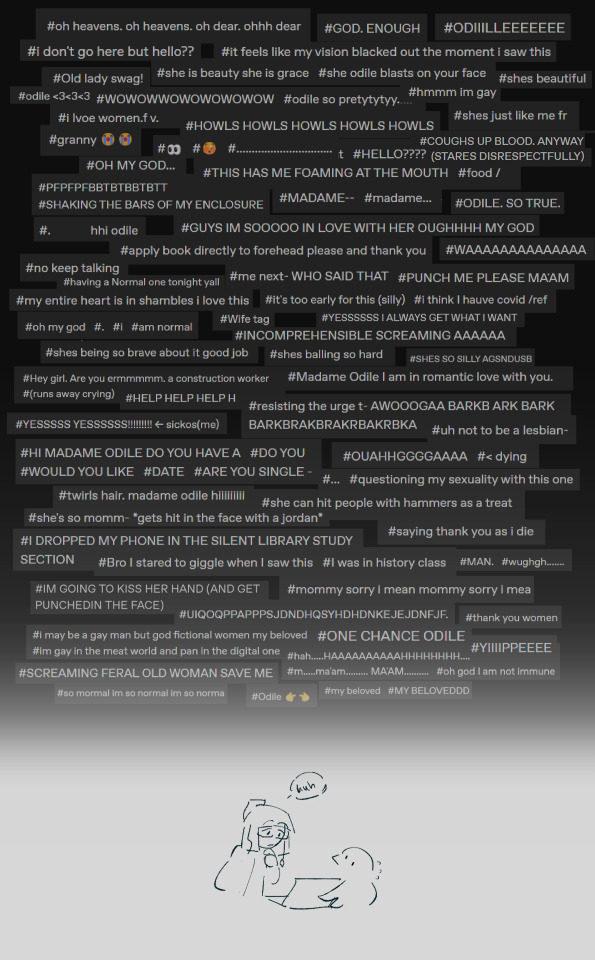
1,,,, 100 days,,,,,,,,, and 800 followers,,,,,,,,,,,,,
From the bottom of my heart, thank you everyone.........!!!!!!!!!!!!!!!!!!
#that's insane............... where did you all come from..................#isat#in stars and time#isat odile#day 100#!!!! we did it guys!!!!#Man... in no way I could've imagined that I would reach day 100 for daily odile. I mean sure I missed a lot of days but. 100 odiles...#and. almost 900 followers? Are you kidding me? What? Huh? Wow????#thank you to everyone's who's ever reblogged my art and requested stuff in the inbox#but especially to those who go wild in the tags. the tags give me life. ive collected them for power. as you can see#(tag yourself for funsies hehe)#apologies if this tag collection's a bit outdated. I actually had this prepared since 500 followers but kept getting too scared to post it#Now that we've reached 100 days it might as well be the perfect occassion to#Here's to 100 more days of unreasonable obsession to a certain old woman from a certain timeloop game!🥂#- yours truly; sketchz (casual odile enjoyer)
415 notes
·
View notes
Text

Incoherence detected! Degraded visual profile.
#corru observer#corru.observer#akizet#beebfreeb art tag#gif#flashing gif#<-?#finished this immediately became exhausted#I am not caught up with everything in the game yet because I can't figure out how to progress to the newer stuff?#Says I reached the end of main content but I know there's newer stuff.. I beat the golem maintenance boss and can no longer progress. Odd.#I will be going to sleep now though okayyy#EDIT FROM TWO MONTHS LATER: I DID IT. YAY.
434 notes
·
View notes
Text
Saw some old vines and got inspired:
So here y'all go, Spiderverse as Vines!
#am I late? maybe#but better late than never#getting used to use a new video editor so this was a good exercise for that#some of these might be a reach but I had fun making them so I included them anyways#okay now who to tag...#hobie brown#spider punk#miles morales#spider man#miguel o'hara#spider man 2099#gwen stacy#spider gwen#peter b parker#pavitr prabhakar#spider man india#LYLA#hope this post shows up in the tags cause usually tumblr won't let my video posts show up there for some reason#across the spider verse#atsv#spiderverse#vine#my video#my post
420 notes
·
View notes
Text



timeskip colin and deli mostly because I was sad deli didn’t get any kind of outfit change
#lou described it so well too man#the way theyre contrasting colors now…. yeah im reaching#dimension 20#ravening war#my art :)#colin provolone#thane delissandro katzon#out of date title tag#oh well#charcuterie swords
2K notes
·
View notes
Text

some sketches of Lorenzo de Medici and Galeazzo Maria Sforza :)
⭐ places I’m at! bsky / pixiv / pillowfort /cohost / cara.app / tip jar!
#early days probably. in their 20s? altho the first one is definitely more like. teenagers.#anyway. hello. I’m back from visiting family in the ICU. I connected dots about Galeazzo and Lorenzo so thank you#to everyone who helped with that!#at long last. a conclusion was reached. I’m also going to bed now.#drawing tag#italian renaissance tag#the last 3 were ideas for more serious drawings tbh. the hand one is going to have blood on it for sex and violence reasons. ofc#the snake thing was a clown car connect the dots moment because I was looking up something about tristano and went#‘what the fuck’ when I saw the image of the coat of arms on Wikipedia. like. yeah okay that’s thematically on point for#this family. but WHY#lorenzo de medici#galeazzo maria sforza
335 notes
·
View notes
Text
My favorite thing about the MCYT Sexyman poll is that it has 100% breached containment on a multitude of levels. ZombieCleo knows, which means Joe Hills is vouching for his own sexyman-ness, and because Cleo posted about it on Twitter, MythicalSausage is proclaiming himself as the sexyman-est of the lot. It's being discussed on CaptainSparklez' subreddit, it's being talked about in Minecrafter livestreams, even Technoblade's dad is telling fans to go vote for Techno. And above all, almost everyone agrees that GoodTimesWithScar is gonna win by default with very little competition.
This thing has bypassed the walls of Tumblr completely to the point where the creators themselves are campaigning for their own MCYT personas to win, and I've never been prouder to be part of something so silly and joyous.
May the best MCYT Sexyman™ win!
#MCYT Sexyman#MCYTblr Sexyman#THIS IS MY FAVORITE THING ON THE INTERNET RIGHT NOW#MCYT#Hermitcraft#Empires SMP#DSMP#I dunno this thing reaches every corner of the MCYT sphere#I don't think I can tag them all xD#1k#2k
3K notes
·
View notes
Text



Gale 🥺
#we've reached 'spending way too many hours with reshade/photoshop' level of character interest. it's official; it's a blorbo!#[2 days ago after youtubing some scenes] eh his romance seems alright. glad i looked it up first [me now] i'm feral for him actually#baldurs gate 3#gale of waterdeep#gale dekarios#bg3#.... i should probably make a tag for my gifs: evt gifs it is#worked so hard trying to balance quality/file size but watch tumblr ruin it anyway as per my last post
329 notes
·
View notes
Text
Language learning: slow learning versus toxic productivity
Or: the process in crisis
Five years ago, all of the productivity advice I read (and gave out) as a successful self-learner of many different languages had one basic premise: that I was not doing enough, and that I could always be doing more.
Several burnouts later, running headlong from one mental illness into another, I'd like to invite you to entertain the exact opposite idea: there is a limit to what you can do. I have run face-first into mine on multiple occasions, and burnt out. At many points I've stopped learning the language at all. Most importantly, I've learnt to be distrustful of the very premise that all of the so-called productivity or optimisation advice is based on.
More is not always more.
Listen to a podcast in the target language whilst you exercise. Exercise to give yourself more energy to learn your target language. Talk to yourself in the shower in your target language. Do Anki whilst eating breakfast. Listen to Glossika whilst walking to work. Change your phone settings to your target language. Bullet journal. Manage your time. Make friends in your target language. Control your time. Write a diary. There's always enough time. These are all things I have done myself and recommended others do, to increase exposure to the language, to increase productivity.
Productivity? What productivity? What, exactly, is it that we are producing? I am producing sentences and words but - for who? Who is listening? Nobody's here, in my room, at 7am on a Sunday. If productivity were just speaking or writing, I'd be productive in my native language too, by virtue of speaking out loud. Or conversely, in language learning circles, should we measure it in terms of input? How many hours did you spend listening to Chinese yesterday? What about today? Is there anything you do in your life, in your daily life, that you could optimise? You're wasting time. There's time here, for those that want it. If you want to get ahead, to be successful, to be a good language learner, you have to know how to use that time. Go online, and debate over which tools are the best; watch your videos. What exactly is it that is being produced?
Productivity is a measuring tool for concrete output: the productivity of a field means how much crop it can yield per harvest. The productivity of a factory is how many mobile phone chargers it can bring to market per year. There are direct and measurable ways to increase this sort of productivity. But what is productivity when it comes to knowledge work? Cal Newport's work, The Minimalists, Essentialism: they all run into the same problem, which is that nobody seems to know what 'productivity' for knowledge workers means at all. You can look at a factory line and see which parts need greasing up, figuratively or literally: it is very difficult, on the other hand, to look at the work of a self-contained writer and tell her where she is going 'wrong'. (And by 'wrong', I mean - slow.) And language learning is an even more particular subset of that particular subset of work.
You could judge a novelists' productivity two ways: by the 'busyness' of her daily writing routine, or the amount of novels she produces. But what exactly is being produced when we learn a language? What is the end product?
In some ways, language learning as a hobby is even more playful than traditionally thought of arts and crafts. (By 'play' I mean something which is done for its own sake, and which is pleasurable, and which may yield next to no monetary reward.) We might think of the poet as sitting on a tree and dangling his feet in the river, a vision of artful indolence, but at the end of the day there is output - a poem. A knitter has a jumper. A potter has a pot. But language learning doesn't follow this [work] + [time] = [tangible output] structure. We can't even use the second metric of 'productivity' to measure it at all. Something is being done, of course - I can learn to speak Greek, and speak it markedly better after two months than one - but my point is you can't look at a day's work and say, this is exactly how much I learnt. Learning is not memorisation in the short term - it's receiving input, and practicing how to wield and use a structure. It doesn't happen over the course of a ten-minute podcast.
Learning happens - encoding happens - when the brain is doing other things. In other words, much like every creative process, you need downtime. You need rest, and sleep, and fun, and brightness and joy in your life. You might 'remember' a bunch of words on Anki, but you need to sleep before you can review them again: that's the whole point.
There is a much wider problem here, a culture of goals and optimising your life and glowing up, and to be honest, I find it disturbing. I think that for a very long time my language learning metrics were a stand-in, a relic, for the kinds of unhealthy and obsessively perfectionist thinking that gave me an eating disorder. How many of us truly believe - genuinely, with every inch of our heart - that we are better people if we 'better' ourselves? Learn more. Exercise more. Study more. How do you feel about yourself at the end of a day, exhausted, because you've completed day 75/100? Do you feel better about yourself because you've achieved? I'm guessing that you do.
For many people - including for myself - this wider culture has spilled over into their hobbies. Hobbies like language learning in particular are a target for this because they are so easily quantifiable - and we are encouraged, if we want to succeed, to quantify them. How else will we know how to improve?
Over the last few years, after burning out, after living off grid and without wifi and doing extreme minimalism and a lot of other lifestyle experiments to try and understand why modern life is so fucking hard, it's become clear that most systems of 'productivity' measure 'optimisation' by getting the most done in a day, but they don't stop to question whether you should be doing those things at all.
They don't stop to ask: what matters? They don't stop to ask: why am I trying to write a novel, finish my dissertation, pursue a romantic relationship, get healthy, learn ice-skating, learn to cook, look after my aging parents, and learn guitar at the same time? They don't ask: how do I prioritise, and where do I find silence? They ask: how do I cram more time in the day? They don't ask: how do I slow time down? They don't ask: how can I know what matters, if I never give myself space to think?
In other words: 'productivity' in language learning is measured by 'busy-work', by how much you can see from the surface.
You can't measure how well the learning is going, exactly, but you can measure how many hours a day you show up and grind. Whether or not that struggle is the best use of your time, or whether you're spending the time on things that will truly bring you value and quality, is a different question altogether.
And it's not one most 'productivity culture' will ever ask.
There will be things in your language learning journey that, to borrow from self-help terminology, no longer serve you. Habits and relics and resources and mindsets that worked for you once, or no longer did. Those books that are too advanced that you feel like you 'should' be able to read. That textbook that's been sitting beside your bed for a year. That habit of scrolling social media in your target language that was helpful when you were at a more intermediate level, but does little for you now that you're advanced.
Take stock of these. Simplify. Do less, but do it better. Productivity culture never stops to ask: what can I do without? It always asks, instead: how can I do more? But maybe - just maybe - the way to do more is to focus on fewer things, but do them well.
Multi-tasking isn't multi-tasking, but switching quickly between different focuses of attention. The average American owns 300,000 things, and watches television for 4-5 hours a day. On average, if you are distracted, it takes you 20 minutes to reach the same level of deep focus: but the average American office worker opens an email within six seconds of receiving it. Are you any better with your phone? How much time do you spend there? If you meditate, that's wonderful, but do you have any time to let yourself think? To walk and to understand how to feel? I don't want to sound like a boomer, but: can you name the birds? Do you live in a place, not just a room?
Stop trying to be 'productive'. Do less. Do it well.
I am now facing a wall in my learning of Chinese, and I'm still not sure how to get around it. The reason for this is because so much of the advice I gave others around language learning, and so much of the advice I found online, is focused on this sort of optimisation. But I no longer want to be listening to something, to be watching something, every second of every day. I have a partner to love and a house to appreciate and I want to spend time, humming and pleasant, alone with my thoughts, and it's summer, dear diary, and I don't want to stay indoors. Routines can keep you afloat, but they can also drown you. Do something different. Do something new. Do something that is not productive, that produces nothing, idle away, walk to work without music and perhaps when you sit down to your language learning that evening, you'll be filled with a renewed vigour and love for it. Do it because you love it, not because you scheduled it in your calendar.
A lesson, related, from my martial arts teacher. He said:
If you are tired, do not train. If you do not train, rest. 'Rest' does not mean go on your phone.
The same principle applies here. If you are tired of learning, which you may well be, rest. Not going on your phone, not watching Netflix. I mean taking a walk and sitting under the tree and looking at the patterning of the sky. I mean lying with your dog and absently scratching his tummy. If you're tired, and you have the luxury to stop - stop. Let yourself be tired. Don't drink caffeine. Sleep.
Last year, I was able to write 340,000 words of fiction because I focused on one thing: writing my book. Apart from things that I literally needed to do to survive and maintain my health and relationships around me, I didn't set a single other to-do. My daily list looked like: write for three hours. Not a word limit. Not exercise, though I ended up doing that, not learning a language. I imagine that if I had tried to focus on Chinese at the same time that I wouldn't have achieved anywhere near half the result. I still learnt Chinese, a very decent amount - I went to China and Taiwan for three months in total! - but I did it because I wanted to, of a whim, on a Sunday, something fun. It wasn't a must, or anything I was forcing myself to do. Many days I didn't do any Chinese at all. It was so immensely freeing to be able to think, at 11am: I'm finished for today. Even when I was at work, because I knew I was just there to pay the rent, I felt serene. Stressed on a day-to-day level, certainly, because all work is stressful, but - there wasn't any striving. I just did the best I could. And that was enough.
I am writing this, now, as I come out of my first ever information-overload burnout. I've burnt out, but I've never experienced one of these before: even looking at a book, at a phone, physically hurt my eyes. I couldn't bear to listen to people speak and would lock myself away in my room. I physically felt I could not talk, and had to take extensive time off work. Even looking at a pen and a blank page was too much; listening to podcasts was too much; reading the instructions for dinner was too much too. The only way I could heal was by doing absolutely nothing at all. That period shocked me deeply, because it showed me how absolutely dependent I was on having some input of information all of the time. No wonder I was tired.
I know, now, that there are lots of movements built around this same idea, by frustrated learners all over the world: the growing realisation that metrics and Excel and polylogger and tracking tracking tracking can't be the only way to learn. That a list of the number of books you've read in one year is hardly indicative of how well you understood those books, and what you learned from them. You've read 20 books this year already - good job. When do you think about them? What time do you spend on reflection? Why did you choose those books? Which chapters, and which characters, hit you the hardest? Why?
Minimalism, deep work, 'monk mode', essentialism, every writer's dream to run away and write in a cabin in the woods, slow learning, Buddhism, Stoicism, Marie Kondo-ism, the art of less, project 333, my no-buy-year, slow fashion, slow food, slow travel:
What all of these philosophies have in common is the idea that doing things deliberately ('mindfully') means 1) doing things slowly, 2) doing things well, and 3) doing things one at a time.
I am now at a place in my life where I understand the value of time alone with my thoughts. I don't want to listen to podcasts every minute of the waking day, because I need time to think about them. I need time to let the ideas for my novel grow in the dark. Nothing can be heard in noise; so make space for silence. I am a member of the real, living, breathing world, and that means I cannot devote 8 hours a day to Chinese television shows like I could when I was 20. I have to call my father. I have to do the dishes. I want to flex my creative muscles in other ways. Alternatively - I no longer believe that my worth is tied up inherently with how well I do my hobbies.
You're just some guy. There's freedom in that. You, my friend - you suck <3
Let yourself be bad. Let yourself be mediocre. Let yourself 'slide backwards' or regress, because all that means is that you're putting focus somewhere else. It'll come back. It always does.
I'm no longer comfortable, therefore, with the way that the language learning community tackles productivity. Please don't misunderstand; a lot of us have time spare that we could use to do things 'better' for us. I know. But I just believe now that getting rid of things, like the time you spend on your phone, is going to be more helpful in the long run than trying to force yourself into some gruelling, achievement-centric regime that collapses from within after two months of struggle and self-flagellation.
The other realisation I have had is just how much happier I am spending more time being alive, really alive, and less time in front of a screen. For a language like German or Gaelic that's much easier, because you can study with books, but with Chinese you always have to study to some extent with audios, flashcards, computers. Especially if - like me - you can read novels without a dictionary, but cannot handwrite even your Chinese name. So where next?
I don't have any answers. I'm not sure how to pair the two things together, to be honest, because almost all of my language learning has traditionally made use of technology. It's all been goal-orientated, systems-orientated, and despite the fact that I've failed at using these systems every day for years, despite the fact that Anki has NEVER worked for me, despite the fact that I have spent hundreds if not thousands of pounds on courses here, there, a wealth of overwhelm and five thousand words saved on Pleco, did I read that right? Five thousand. No wonder I'm stressed.
Regardless of happiness, it's much easier to achieve a state of deep focus and work when you're not online. After my period of information burnout, I feel actual physical pain from the weight of choices online. It's exhausting. I'm watching a Chinese show, but I want to go on tumblr. I'm on tumblr, but I feel guilty for not watching the Chinese show. I'm constantly torn between doing this and that, never fully committing to anything, seeing a post by Lindie Botes and thinking, damn, she's good. I should be better. But I don't want to compare myself to her. Do you know what? She is good. I admire her immensely. But I don't want to judge my self-worth by some imagined scale of productivity anymore - and, the more time passes, the more I'm not sure what 'productivity' in the context of language learning even means.
Try slow, focused, deep learning. You might just find it works.
There's something refreshing, almost counter-cultural, anti-capitalist, anti-consumerist, anti-rat-race, about this thought. Slow learning. I think there's an answer here, somewhere. It's a problem I've been dancing around for a while; and do you remember how you learnt your first foreign language? For me, it was on the floor, absolutely absorbed in German comic books, flicking through the dictionary furiously and scribbling things down in a notebook. I only had one book, and one dictionary, and one grammar book. I want to go back to that sort of simplicity. There was joy in that.
One again: I don't have any answers. I don't know exactly what direction this blog is going to go in, as I wrestle with these sorts of meta-problems. I'd love to hear your thoughts. And for now, if there's one thing I'd like you to take away from this long and frankly absurdly rambling post (thank you for bearing with me!) it's an alternative answer for the question I get so often, about what you can do to learn the language when you're tired, because:
Yes, you could watch reality TV shows in Chinese, or you could give yourself permission to be human. You could rest.
Thanks guys. Meichenxi out <3
#langblr#language learning#languages#productivity#productivitytips#^ tagging it with all of the above so it reaches the target audience of stressed out 17 year olds#my dudes. my guys. you are loved. or if you are not now - you will be#all will be well
269 notes
·
View notes